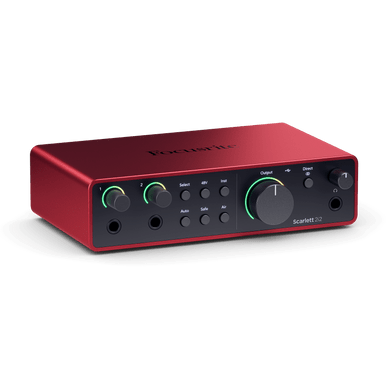Just announced the refresh of the most popular audio interface line on the market, now with 120 dB of Dynamic Range and auto gain. Very curious to see how they measure.
 focusrite.com
focusrite.com
Pricing:
The 2i2 4th Gen:
Line outputs (Balanced)
Frequency Response 20-20kHz ± 0.02dB
Dynamic Range 120dB
THD+N -109dB
Maximum Output Level 16dBu
Impedance 100Ω
Headphone outputs
Frequency Response 20-20kHz ± 0.1dB @ 33Ω / 300Ω
Dynamic Range 112dB @ 33Ω 115dB @ 300Ω
THD+N -99dB @ 33Ω -108dB @ 300Ω
Maximum Output Level 2.5dBu into 33Ω 10dBu into 300Ω
Maximum Output Power 32mW into 33Ω 22mW into 300Ω
Impedance 50Ω
Analogue to Digital Converter
THD+N -110dB
Dynamic Range 120dB
Digital to Analogue Converter
THD+N -115dB
Dynamic Range 130dB (A-Weighted)

 focusrite.com
focusrite.com

Scarlett 4th Generation Audio Interfaces | Focusrite
Introducing the new Scarlett Solo, 2i2 and 4i4 4th Generation. Incredible preamps, colossal dynamic range and re-engineered Air mode for big studio sound.
Pricing:
- Solo: $139.99
- 2i2: $199.99
- 4i4: $279.99
- Solo Studio: $249.99
- 2i2 Studio: $299.99
The 2i2 4th Gen:
Line outputs (Balanced)
Frequency Response 20-20kHz ± 0.02dB
Dynamic Range 120dB
THD+N -109dB
Maximum Output Level 16dBu
Impedance 100Ω
Headphone outputs
Frequency Response 20-20kHz ± 0.1dB @ 33Ω / 300Ω
Dynamic Range 112dB @ 33Ω 115dB @ 300Ω
THD+N -99dB @ 33Ω -108dB @ 300Ω
Maximum Output Level 2.5dBu into 33Ω 10dBu into 300Ω
Maximum Output Power 32mW into 33Ω 22mW into 300Ω
Impedance 50Ω
Analogue to Digital Converter
THD+N -110dB
Dynamic Range 120dB
Digital to Analogue Converter
THD+N -115dB
Dynamic Range 130dB (A-Weighted)

Scarlett 2i2
The original studio-quality 2-in, 2-out interface, Focusrite Scarlett 2i2, has been remastered for the artist.
Last edited:
